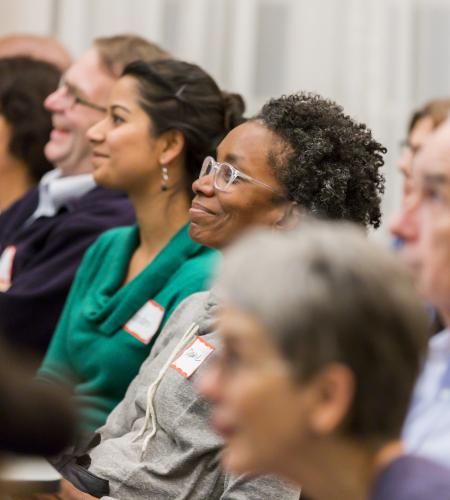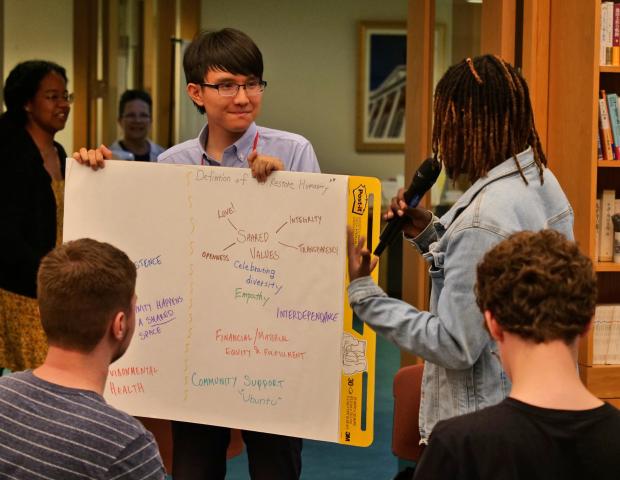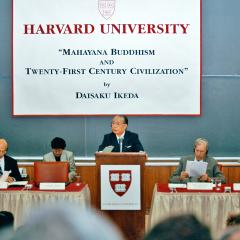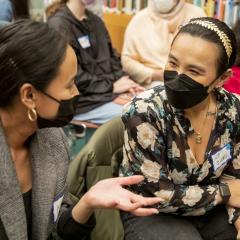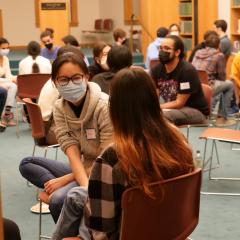What does it take to restore our humanity? This simple but ambitious question served as the focus for the fourth Dialogue Nights of 2023, held on August 4th. With nearly 60 Boston-area university students and young professionals in attendance, the result was a rich discussion that blended optimism with an acknowledgement that the task is a daunting one in a world such as ours, fraught as it is with spiritual and material challenges to dignity, well being, and social unity.
Participants were welcomed by the Center’s Preandra Noel, who shared that “Dialogue Nights was inspired by our Center founder Daisaku Ikeda’s belief in the infinite potential of youth to be agents of change in our local communities.” This belief, she said, is coupled with our hope that everyone in attendance will experience “the transformative power of dialogue.” Once again, the Dialogue Nights topic was inspired by the Center’s founding lecture, delivered by Mr. Ikeda at Harvard University in 1993: “Mahayana Buddhism and 21st Century Civilization.” Mr. Ikeda also addressed this theme of human restoration in a 2001 video interview, in which he stated:
What we need most is to restore and revive our humanity. We must create a society where people can live with dignity, a society where people can live in peace and happiness… . It may seem like a long and distant path, but I am convinced that the twenty-first century must see a movement to sow the seeds of peace, happiness and trust in every person’s heart. The seeds of a truly humane way of life. I am convinced this is the only path.
Two Perspectives
Following a show of hands from people about the possibility of such restoration – results ran the gamut – Preandra turned the floor over to the evening’s two featured speakers, Kip Clark and Anthony Jojola. Both are members of the Ikeda Center Youth Committee. They shared personal reflections on what it might take to restore our humanity, their confidence in that happening, and what it would look like to “sow the seeds of a truly humane way of life” in our day-to-day experiences.
Leading off, Kip said that “honesty is important in thinking about restoring humanity” and “you can only heal” by acknowledging what is painful. The key, here, he said, is that we need to actually feel our pain, and “not dismiss it as a defect within us.” Given the nature of this challenge, Kip expressed some confidence that “maybe on an individual level” we can achieve restoration. However, he was less certain about the collective level, and felt it’s highly unlikely “institutionally.” Reiterating his main point, he said that “I think if we can get past our pride, if pain isn’t seen as a flaw, and if we can find the courage to express it, that would give me hope.” Another obstacle he identified is the “discrepancy between action and awareness.” In our digitally connected world awareness of problems has “increased exponentially” but we tend to be so overwhelmed that actions haven’t kept pace. Citing the saying that “we don’t actually move towards what makes us happy, we gravitate towards the familiar,” he wondered if we’ve become a bit too familiar and comfortable with our current, unhappy state of affairs – afraid to abandon our “home” even though it “hasn’t properly sheltered us.” Turning to the day-to-day, he said that what we need is “strength, in an emotionally resilient way” and also a lot of “cultural patience.” Then, connecting a recent relationship disappointment with our larger task, he observed that “the hope I felt and the pain I feel are a question and answer orbiting the same universal need for safety, love, and connection.” Ultimately, we need to put ourselves out there in in an honest way, expressing our optimism, so that we might meet others that share that. In other cases, we might meet those that share our pessimism too. Maybe this balance between optimism and pessimism, he conjectured, “is what makes us human.”
Anthony opened by saying that the first part, what we need to do to restore our humanity,” is an “easy one. Be kind. Be a good person. Be nice to people. It’s simple. It’s easy. That’s the answer.” The next part is where he “gets stuck,” though. “Honestly,” he said, “I have to say it’s really hard to believe that it is possible to restore humanity with all the historical and even current examples of how humanity is not kind, nice, just, or fair to itself.” But still, or maybe even especially because of this we must resist saying, “well, that’s just the way the world is, that’s just how the world works.” Turning to Ikeda’s statement, he mused that this notion of restoring “can’t mean going “back to something better” since we are not “a perfect race and there has always been inequality in the world.” That said, what Anthony really appreciated was that “there’s a sense of conviction and there’s belief in it, and I think that’s what we have to hold on to.” One way we maintain belief is by constantly monitoring one’s own “perspective,” just as, how, in stressful Boston traffic, he always finds it’s his own attitude that keeps him calm and centered, even when people cut him off. Also key, he said, is to “surround yourself with people that are nice, that are kind, that help lift you up, or at least don’t bring you down constantly.” This is how we develop the “resilience” and capacity to be able to bring strength and joy to others, or at least the ability to, as he phrased it, “sprinkle in a little nice” when interacting with others. Ultimately, when it comes to thinking about restoring humanity, the key is “just trying to do our best with what little we can do. Because, in the end, we effect our immediate vicinity, and then we expand from there.”
Whole Group Dialogue: What Restoration Calls For
After the presentation, the Center’s Anri Tanabe moderated the small group dialogue activity, which was organized around this question: What do you think is necessary to restore our humanity in this current moment, individually and collectively? During report-back to the whole group, several key themes emerged.
Structural and material foundation
The very first point made during share-back was that each person’s realization of their fullest humanity requires material support. Put simply, said one, a lack of resources “can cause a lot of stress.” Thus, things like Universal Basic Income and full public healthcare, suggested another, could very well be essential to “self-actualization.” This latter term comes from Maslow’s Hierarchy of Needs, which was mentioned by three different groups. In this schema, physiological and safety needs provide the foundation for ascending needs that culminate in actualizing as all that one can be.
Shared values
To achieve the restoration of humanity, suggested one group, would mean the prioritization and realization of shared values such as “love, integrity, openness, transparency, and the celebration of the diversity among ourselves.” Another group suggested that instead of “restoring,” it might be preferable to speak of “finding,” which means identifying “the core needs that we all share.” One path to such finding, added another group, is the practice of empathy. If we can’t exactly walk in another’s shoes, they said, we can share “our individual journeys,” revealing unexpected connections in the process.
Discomfort and vulnerability
Closely related, was the idea that getting in touch with vulnerability and discomfort can reveal our common humanity. Two metaphors revealed the range of what this could mean. We need to have some “mosquitos,” said one, meaning “we need to have some nuisances” to appreciate life. Another put it in more dramatic terms, saying we need to be “placed in a cage with a tiger,” thus accessing the primal vulnerability we all share as human beings. Another urged us to seek “uncomfortable community.” For example, they asked: “When’s the last time you’ve been to a homeless shelter to help cook a meal?”
Actions right now, in the moment
One of the most fundamental things we can do to restore our humanity is “being humble and being present with ourselves, … right now in this moment,” something another participant called escaping “the cult of busy.” One important aspect of being present is to “manage our responses” to events and occurrences, especially in an emotional sense. Another echoed this, saying we need to pay more attention to processing and choosing our responses to interpersonal social stimuli. Finally, another shared how they observed a bus driver being kind to a homeless person, which inspired some of the passengers to ask how they could also help the person. This is the humanizing “snowball effect” that can happen when we choose to “pay it forward.”
Conclusion: What We Can Do
Before introducing the closing activity, Preandra shared Buddhist-based insights from Mr. Ikeda on the realization of our human potential. Citing from his 1993 Harvard lecture, Preandra introduced the following passage from Ikeda: “Buddhism is not merely theoretical, but seeks to enable us to guide our lives, moment by moment, toward happiness and value-creation.” It “indicates an attitude of confronting each of life’s problems with our full being,” adding that “awakening the entirety of our consciousness and leaving no inner resource untapped…. It is the light of this inner wisdom that at each instant encourages and guides our actions towards the true and correct.”
“And so with this in mind,” said Preandra, “for the last activity of the night, we want to show this light that we all have.” To do this, the group arranged in a circle and each person was given a tealight candle that they would turn on after sharing with everyone a brief thought on “the ways you, from this moment on, plan to restore humanity, whatever that means to you.” The clarity, variety, and compassion of participant insights suggested that if the project of the restoration of humanity is a big and open-ended one, there is much that can be done here and now to tangibly nurture our shared experience of being human. Here is a sampling of their commitments (view the whole list here). To restore humanity, I will:
Protect and empower the vulnerable in the communities and spaces that I am in.
Seek the truth in things I don’t understand.
Be courageous enough to be authentic every day.
Stay totally calm and relaxed and pass that energy on to other people.
Show up as open and present as I can in my interactions with other people.
Not project my anger and sadness onto people.
Develop enough courage to stand up for myself and enough to stand up for other people.
Challenge myself to always forgive and understand that people make mistakes and deserve another chance.
